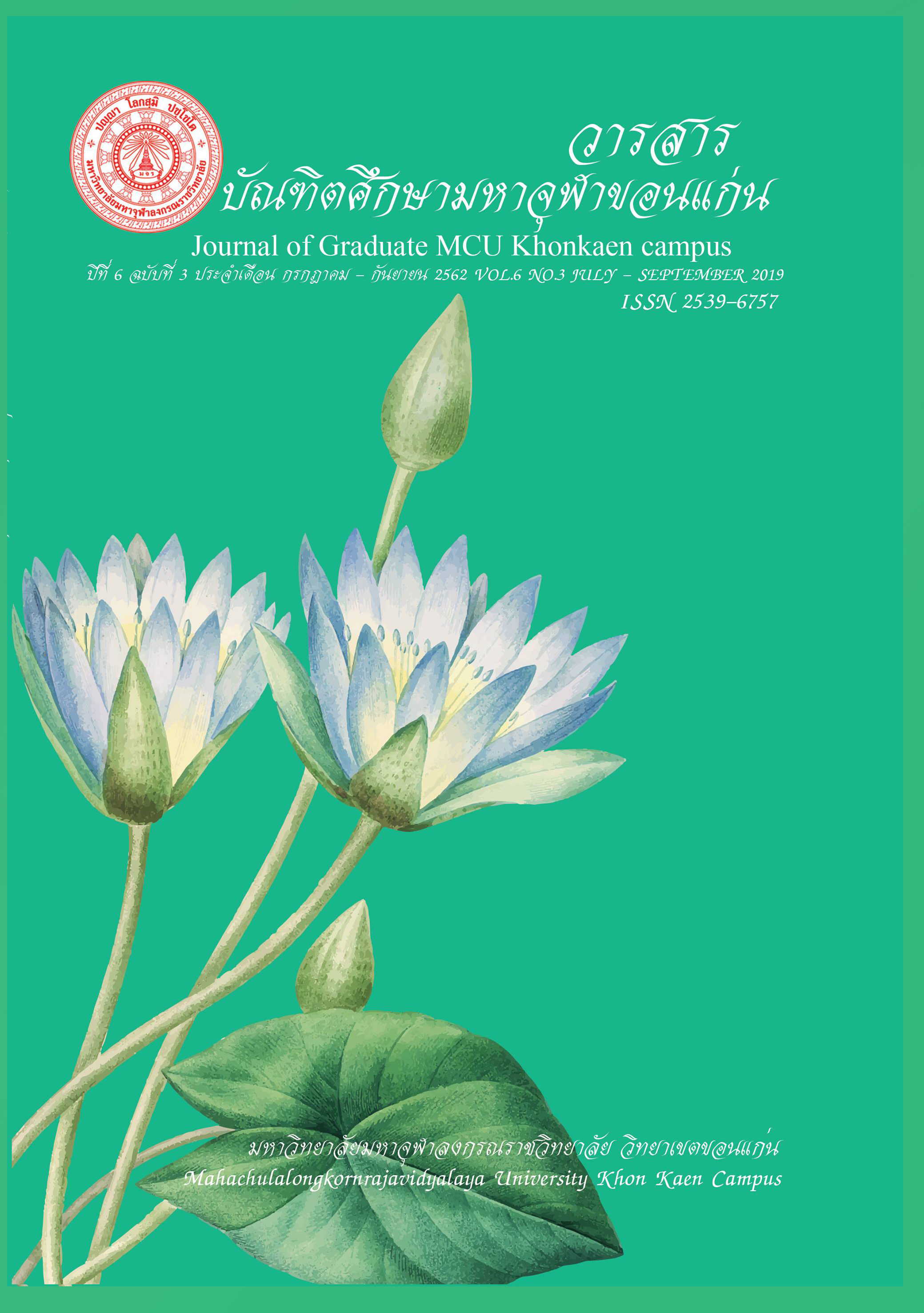APPROACH TO QUELL THE CONFLICT IN THERAVADA BUDDHIST PHILOSOPHY
Main Article Content
Abstract
งานวิจัยนี้ มีวัตถุประสงค์ คือ 1) ศึกษาเหตุแห่งความขัดแย้งตามทัศนะของพุทธปรัชญาเถรวาท 2) เพื่อศึกษาแนวทางการระงับความขัดแย้งตามทัศนะของพุทธปรัชญา 3) เพื่อศึกษาวิเคราะห์แนวทางการระงับความขัดแย้งเชิงพุทธปรัชญาเถรวาท การวิจัยครั้งนี้เป็นการวิจัยเอกสาร (Documentary Research) โดยการศึกษาค้นคว้าจากเอกสาร ตำราวิชาการ หนังสือ งานวิทยานิพนธ์ งานวิจัยต่างๆ แล้วนำเสนอผลการวิจัยด้วยวิธีการวิเคราะห์เชิงพรรณนา
ผลการวิจัยพบว่า ความขัดแย้งในทัศนะของพุทธปรัชญาเถรวาท เป็นธรรมชาติของมนุษย์ที่สามารถแก้ไขได้ หลีกเลี่ยงได้ ปรับเปลี่ยนได้ การกระทำที่มุ่งเอาประโยชน์ตนเป็นหลัก ไม่คำนึงถึงผลเสียที่จะเกิดกระทบต่อคนอื่น เป็นเหตุปัจจัยทำให้เกิดความขัดแย้งในทัศนะของพุทธปรัชญา “เหตุปัจจัยภายใน” และ “เหตุปัจจัยภายนอก” ได้แก่ อกุศลมูล ปปัญจธรรม ตัณหา ทิฏฐิ มานะ มัจฉริยะ และอคติ 4 ส่วนเหตุปัจจัยภายนอก ได้แก่ ข้อเท็จจริง ผลประโยชน์ ความสัมพันธ์ ชาติพันธุ์
กระบวนการจัดการความขัดแย้งตามทัศนะของพุทธปรัชญาโดยใช้อธิกรณสมถวิธีและหลักสาราณียะธรรม หมายถึงรูปแบบและกระบวนการแก้ไขปัญหาอธิกรณ์ที่เกิดขึ้นและสงฆ์จะต้องชำระหรือดำเนินการแก้ไขให้สงบระงับส่วนกฎนิคหกรรมหมายถึง ระเบียบปฏิบัติตามระบบกระบวนการยุติธรรมของศาลเพื่อใช้ลงโทษแก่พระภิกษุผู้กระทำผิดละเมิดพระธรรมวินัย แต่แตกต่างกันคือเป็นรูปแบบที่แตกต่างกัน สาราณียะธรรม การจัดการความขัดแย้งของการปกครองแบบสามัคคีธรรม
แนวทางการระงับความขัดแย้งเชิงพุทธปรัชญา แนวทางการระงับความขัดแย้งตามทัศนะของพุทธปรัชญา ได้แก่การมีความเห็นใจ สร้างความเป็นมิตร และส่งเสริมให้ช่วยเหลือกัน แท้จริงแล้วก็คืออุปกรณ์ในการทำลายจิตที่ประกอบด้วย ความเห็นแก่ตัวของมนุษย์ โดยอาศัย 1) หลักเมตตาจะทำลายความโกรธ ความเกลียด อาฆาต พยาบาท 2) ความเป็นมิตร ความปรารถนาดีต่อบุคคลอื่น โดยไม่จำเพาะเจาะจง จนกระทั่งถึงบุคคลที่ไม่เป็นที่รักคือศัตรู 3) ทานคือการช่วยเหลือกันด้วยวัตถุสิ่งของ ทานคือการให้ การเสียสละ การแบ่งปันเพื่อประโยชน์แก่คนอื่น ช่วยปลูกฝังให้เป็นคนที่ไม่เห็นแก่ตัว ซึ่งเป็นเหตุเกิดความขัดแย้งของมนุษย์ได้
คำสำคัญ : การระงับ, ความขัดแย้ง, พุทธปรัชญาเถรวาท
Keywords: suspension, conflict, Theravada Buddhist philosophy
Article Details
References
The research found that Conflict in the view of Theravada Buddhist philosophy Is human nature that can be solved Avoid Adjustable Actions that are primarily based on their benefits Regardless of the negative consequences that will affect other people Is a factor causing conflict in the view of Buddhist philosophy "Internal factors" and "external factors" such as Salakul Punpanatana, Thitthi Manathamati, Passion and Prejudice, 4 external factors, namely facts, benefits, ethnic relations
Conflict management process according to Buddhist philosophy by using interrelated methods and principles of the dharma Means the form and process to solve the problems that occur and the monks must pay or make corrections to calm and suppress the law. Regulations complying with the judicial system of the court in order to punish monks who violate the Dhamma discipline. But the difference is that it is a different form of the dharma
Dharma, conflict management of fellowship
Guidelines for suppressing conflicts in Buddhist philosophy Guidelines for suppressing conflicts according to Buddhist philosophy Including sympathy Friendly And encourage each other to help each other Indeed, it is a device to destroy the mind that consists of Human selfishness by living 1) Mercy principles will destroy anger, hate, malice 2) Friendly, good wishes to others Without specificity Until the person who is not the beloved is the enemy 3) Eat is to help each other with the object of food, to give sacrifice, to share for the benefit of others. Help cultivate a selfless person Which is the cause of human confli

